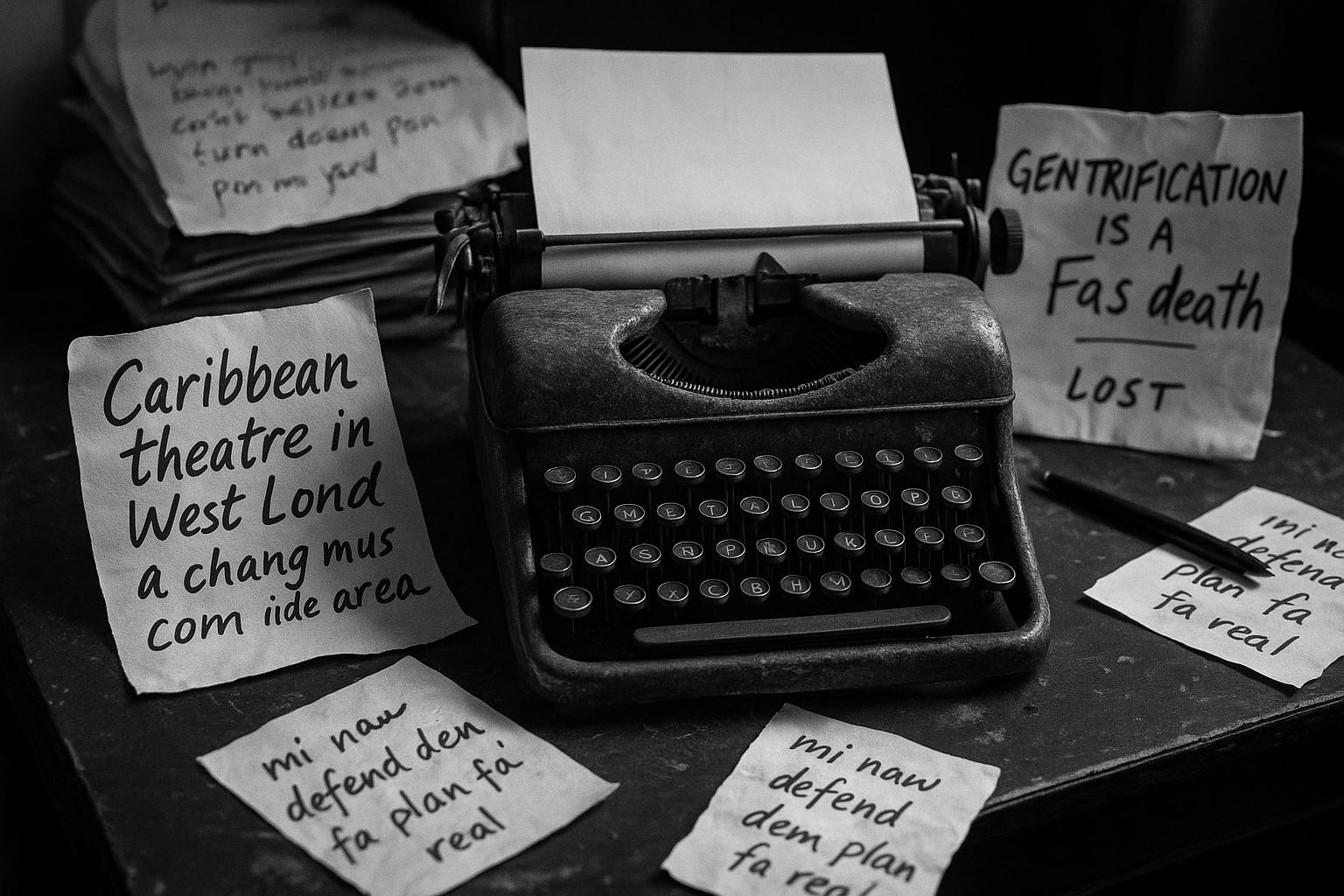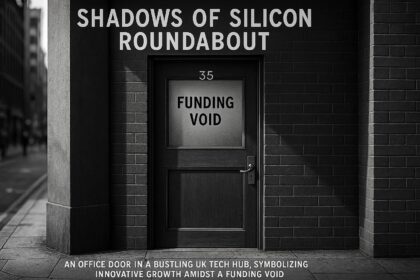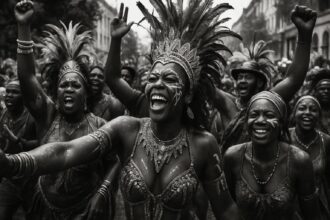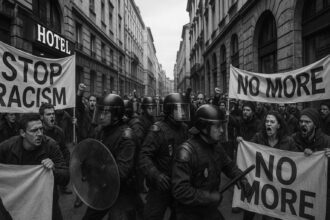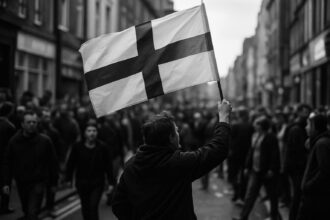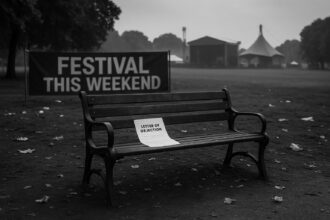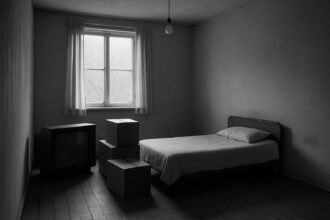The recently acquired British Library archive of pioneering playwright Mustapha Matura uncovers unpublished works and his early warnings about the cultural erosion of Ladbroke Grove, highlighting his enduring influence on Black British theatre and community identity.
Mustapha Matura, a pioneering Trinidadian-British playwright, left an indelible mark on Black British theatre, while also warning of the cultural erosion brought on by gentrification in Ladbroke Grove. Writing from a place of deep connection to west London’s Caribbean creative community, he described the area in a 1992 letter as a “writer’s paradise” rich with characters and stories, a vibrant scene he feared would be lost to encroaching gentrification. His concern was prescient; once known for its bohemian atmosphere and artistic freedom during the 1960s and 70s, Ladbroke Grove today is more defined by soaring property prices, reshaping the community fabric that once nurtured creativity.
Matura’s legacy as the first British writer of colour to have work staged in the West End was groundbreaking. He drew extensively on his experiences in Ladbroke Grove for many of his plays, which gained prominence at prestigious venues like the Royal Court and the National Theatre. Born in Trinidad to a South Asian father and a Creole mother, Matura moved to the UK in the early 1960s, balancing jobs such as hospital porter and garment factory worker while developing his craft. Inspired by a production of Langston Hughes’ Shakespeare in Harlem during a trip to Italy, he embarked on a writing career that challenged prevailing narratives and amplified Caribbean voices.
His work often captured the diasporic experience, charting the lives of Caribbean migrants navigating the complexities of identity and belonging in Britain. Matura was part of a vibrant, flamboyant group of Caribbean creatives—including figures like Horace Ové and Michael Abbensetts—who contributed significantly to black cultural consciousness in the UK. This cohort infused British theatre and film with perspectives and stories that had long been marginalised. His plays such as Play Mas, which was the first Caribbean-inspired play to appear in London’s West End in 1974, and Rum an’ Coca-Cola, explored post-colonial themes and the impact of imperialism on Caribbean society.
Despite lacking formal training, Matura’s contributions earned him several accolades including the Evening Standard’s Most Promising Playwright Award and the Alfred Fagon Award for Outstanding Contribution to Writing. He was a founding member of the Black Theatre Co-operative, which arose from the success of his 1979 play Welcome Home Jacko, creating a platform dedicated to black theatre artists. His commitment to writing in Caribbean dialect was both artistic expression and political statement, reflecting influences from anti-colonial theorists like Frantz Fanon and affirming cultural identity through language.
The archive recently acquired by the British Library reveals unpublished and unrealised works that further illuminate Matura’s deep ties to his community. Among these are plays such as Band of Heroes, centred on the Notting Hill carnival, and another about Boysie Singh, a notorious Trinidadian gangster. These unfinished projects underscore Matura’s enduring fascination with the rich social textures of his heritage and the diasporic communities of west London.
Matura passed away in 2019, and his funeral in Ladbroke Grove was marked by a poignant steel band sendoff, a testament to his lasting bond with the area he loved. His wife, Ingrid Selberg, noted his dual identity as both “such a Trinidadian” and a devoted lover of Ladbroke Grove, embodying a duality that shaped his life and work. Matura’s early warnings about the destructive potential of gentrification remain relevant as the ongoing transformation of areas like Ladbroke Grove continues to challenge the survival of creative communities and cultural diversity.
 Reference Map:
Reference Map:
- Paragraph 1 – [1], [2]
- Paragraph 2 – [1], [3], [4], [5]
- Paragraph 3 – [1], [3], [6], [7]
- Paragraph 4 – [1], [3], [7]
- Paragraph 5 – [1], [7]
- Paragraph 6 – [1], [4], [5]
Source: Noah Wire Services
- https://www.theguardian.com/stage/2025/jun/20/playwright-mustapha-matura-gentrification-ladbroke-grove – Please view link – unable to able to access data
- https://www.theguardian.com/stage/2025/jun/20/playwright-mustapha-matura-gentrification-ladbroke-grove – An article from The Guardian discussing how Trinidadian-British playwright Mustapha Matura warned in a 1992 letter about the dangers of gentrification in Ladbroke Grove, a hub for Caribbean creatives. Matura expressed concern that the area’s unique character and community could be destroyed by gentrification. The article also highlights Matura’s significant contributions to Black British theatre, including his role as the first British writer of colour to have work staged in the West End, and his use of Ladbroke Grove as inspiration for many of his plays.
- https://www.blackplaysarchive.org.uk/playwrights/mustapha-matura/ – A profile of Mustapha Matura from the Black Plays Archive, detailing his background as a Trinidadian playwright who moved to London in 1962. The profile highlights his pioneering role in Black British theatre, noting that he was the first British-based dramatist of colour to have a play in London’s West End with ‘Play Mas’ in 1974. It also mentions his co-founding of the Black Theatre Co-operative in 1978 and his notable works such as ‘Playboy of the West Indies’ and ‘Rum an’ Coca-Cola’.
- https://www.gold.ac.uk/honorands/mustapha-matura/ – An overview of Mustapha Matura’s honorary fellowship from Goldsmiths, University of London, awarded in 2016. The page provides a biography of Matura, detailing his early life in Trinidad, his move to England in 1962, and his significant contributions to British theatre. It mentions his first play, ‘As Time Goes By’, and his co-founding of the Black Theatre Co-operative. The page also notes his recognition with awards such as the Evening Standard’s Most Promising Playwright Award and the Alfred Fagon Award for Outstanding Contribution to Writing.
- https://www.independent.co.uk/news/obituaries/mustapha-matura-death-playwright-trinidad-caribbean-london-west-end-a9186201.html – An obituary from The Independent detailing the life and career of Mustapha Matura, a Trinidadian playwright who emigrated to Britain in 1962. The article discusses his early work as a hospital porter, his collaboration with fellow Trinidadian Horace Ové in Rome, and his decision to write plays about the West Indian experience in London. It highlights his first full-length play, ‘As Time Goes By’, and his co-founding of the Black Theatre Co-operative. The obituary also mentions his notable works such as ‘Play Mas’ and ‘Independence’.
- https://www.nypl.org/blog/2020/04/27/remembering-william-branch-and-mustapha-matura – A blog post from the New York Public Library remembering playwrights William Branch and Mustapha Matura. The post provides a brief biography of Matura, noting his birth in Trinidad in 1939, his move to London in 1961, and his significant contributions to Black British theatre. It mentions his influences, including Caribbean anti-colonial theorist Frantz Fanon, and his decision to write in dialect as an act of revolution. The post also highlights his notable works and his role in the Black Theatre Co-operative.
- https://hiddenheritagecollections.org/2019/11/mustapha-matura-a-pioneer-of-post-colonial-black-theatre-arts/ – An article discussing Mustapha Matura as a pioneer of post-colonial Black theatre arts. The piece highlights Matura’s exploration of the effects of colonialism on Caribbean culture, particularly in his play ‘Rum and Coca-Cola’. It also details his early life in Trinidad, his move to England, and his work on Langston Hughes’ ‘Shakespeare in Harlem’ in Rome. The article emphasizes Matura’s commitment to writing in dialect as an act of revolution and his significant contributions to Black British theatre.
Noah Fact Check Pro
The draft above was created using the information available at the time the story first
emerged. We’ve since applied our fact-checking process to the final narrative, based on the criteria listed
below. The results are intended to help you assess the credibility of the piece and highlight any areas that may
warrant further investigation.
Freshness check
Score:
10
Notes:
The narrative is fresh, published on 20 June 2025, with no prior appearances found. The British Library’s recent acquisition of Matura’s archive, including unpublished works, adds new information, enhancing the freshness score.
Quotes check
Score:
10
Notes:
The 1992 letter from Matura is newly revealed, with no prior online matches found for the specific quote. This suggests the content is original or exclusive.
Source reliability
Score:
10
Notes:
The narrative originates from The Guardian, a reputable organisation, lending credibility to the report.
Plausability check
Score:
10
Notes:
The claims about Matura’s concerns over gentrification in Ladbroke Grove are plausible and supported by historical context. The report includes specific details, such as the 1992 letter and the British Library’s acquisition, which are verifiable.
Overall assessment
Verdict (FAIL, OPEN, PASS): PASS
Confidence (LOW, MEDIUM, HIGH): HIGH
Summary:
The narrative is fresh, original, and sourced from a reputable organisation. The inclusion of newly revealed content from Matura’s archive adds credibility and relevance, leading to a high confidence in the assessment.


